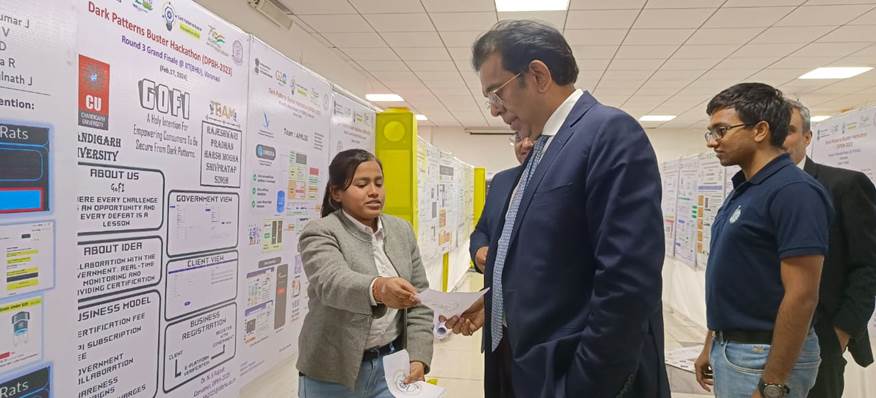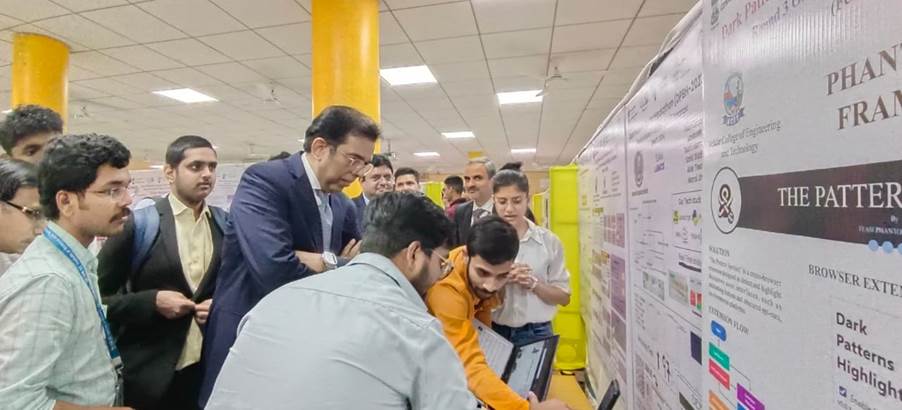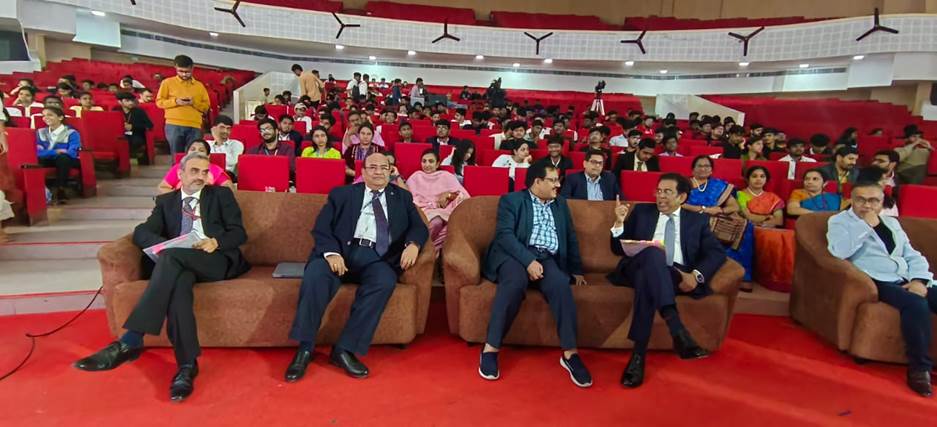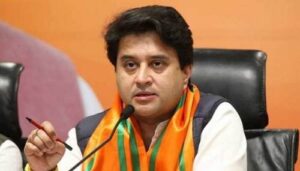- Department of Consumer Affairs in collaboration with IIT (BHU) organized the event
- Over 500 students, from 50 premier engineering colleges including IITs; and NITs, 150 subject experts, and jury members participated
- Winners to be felicitated on March 15, 2024, on World Consumer Rights Day
- The projects are aimed at enhancing digital transparency, empowering users and fostering a safer online environment
The Department of Consumer Affairs, Government of India organised the Inter-college competition Round 3 Grand Finale of Dark Patterns Buster Hackathon (DPBH-2023) at Indian Institute of Technology (IIT) BHU. Shri Rohit Kumar Singh, Secretary DoCA was the chief guest at the event which was organised in collaboration of the Department and the institute.
DPBH-2023 a pioneering initiative, has successfully mobilized a nationwide campaign against dark patterns. The 4 rounds Hackathon was launched by the Department of Consumer Affairs on 26th October 2023 as its continued effort towards combating deceptive online practices. The Hackathon is aimed towards designing & prototyping innovative app or software-based solutions such as; browser extensions, plugins, add-ons, mobile applications etc. that can detect the use, type and scale of dark patterns for e-Commerce platforms.
Secretary DoCA, Shri Singh, congratulated students for their sheer commitment and determination towards making this event a huge success, by showcasing their unparalleled talent. He lauded participants for providing solutions above and beyond the problem statement. He stated that the solutions provided by participants will not only assist in detecting dark patterns but will be a major game changer in regulating other online deceptive practices such as fake reviews, online traps, misleading advertisements amongst others. In his concluding remarks, he emphasized the power of AI in mitigating dark patterns and encouraged participants to leverage the power of evolving technology while also maintaining the ethical decorum.
The DPBH-2023 saw participation from across the country, with over 150 colleges joining the initiative. The enthusiasm and commitment to addressing digital deception were further evidenced by the registration of 40,000+ students, forming 380+ teams to compete in the second round of the intra-college competition. From the competitive pool, 172+ teams were shortlisted to advance to the Grand Finale or Round 3, which was organized at IIT (BHU) on 17.02.2024.

The Inter-college competition Round 3 Grand Finale at DPBH-2023 hosted over 500 students, 150+ subject experts and jury members. Each team presented real-time working models capable of detecting 13 different types of illegal dark patterns as recognized by the Government of India. Following were the key innovations discussed and demonstrated during the event amongst others:
- Large Language Models for Dark Pattern Detection: An exceptional project proposed a browser extension to detect dark patterns on e-commerce sites. It hinges on a 7 billion-parameter indigenously developed and designed Large Language Model (LARA), optimized with a unique dataset and Low-Rank Adaptation (LoRA), enabling precise detection by analyzing HTML content structured into Reseource Description Framework (RDF) via a Document Object Model (DOM) graph.
- Serverless Architecture for Real-time Analysis: Some solutions are featuring a serverless setup using AWS Lambda and cross-encoder machine learning models, with Transformer.js enabling multi-lingual analysis, showcasing scalability and efficiency in identifying “misdirection” and “forced action.”
- Modular Approach for Comprehensive Protection: Some projects have adopted modular approach, integrating text and visual analysis with You Only Look Once (YOLO) technology and React for real-time use alerts, tackling a wide range of dark patterns and prioritizing user privacy.
- Web and Mobile Platform Solutions: Utilizing Random Forest classifiers and Google’s Vision API, some solutions are focusing on uncovering “hidden information” through a user-friendly platform developed with Flask and React Native, enhanced by a chatbot for simplifying privacy policies.
- Browser Extension for Enhanced Transparency: Focused on detecting “fake reviews” and “false urgency,” some browser extensions are employing tech stack such as JavaScript, HTML, CSS, and Python, leveraging machine learning for data analysis and providing a streamlined user experience

These solutions span a broad spectrum of technologies and approaches, tailored to address 13 specified dark patterns identified by the Department of Consumer Not only do they alert consumers about some specific dark patterns, they also provide solution to the government by providing real-time data and identifying other types of emerging dark patterns. These projects are designed to enhance digital transparency, empower users, and foster a safer online environment, directly contributing to the hackathon’s overarching goal of combating dark patterns.
The DPBH-2023 serves as a testament to the collaborative efforts of students, educators, and industry experts in addressing the critical issue of dark patterns. The hackathon not only fosters innovation but also cultivates a culture of ethical digital practices. The hackathon organized by the Department of Consumer Affairs has received wide appreciation from across the globe as the efforts of the students were even applauded in a webinar organized by United Nations Conference on Trade and Development (UNCTAD) on “AI and Dark Patterns”.

The declaration of awards and cash prizes on March 15, 2024, on World Consumer Rights Day, will mark the culmination of this impactful event, celebrating the achievements of participants and furthering the cause of consumer rights in the digital age.
Other dignitaries who addressed the event were Professor MK Meshram of IIT(BHU)’s Electronics Engineering Department, Professor Vikas Kumar Dubey, Dean of R&D at IIT(BHU), Shri Anupam Mishra Joint Secretary in the Department of Consumer Affairs and Dr. NS Rajput, serving as the convener of DPBH-2023 and Associate Professor in Electronics Engineering, IIT(BHU).

*******


